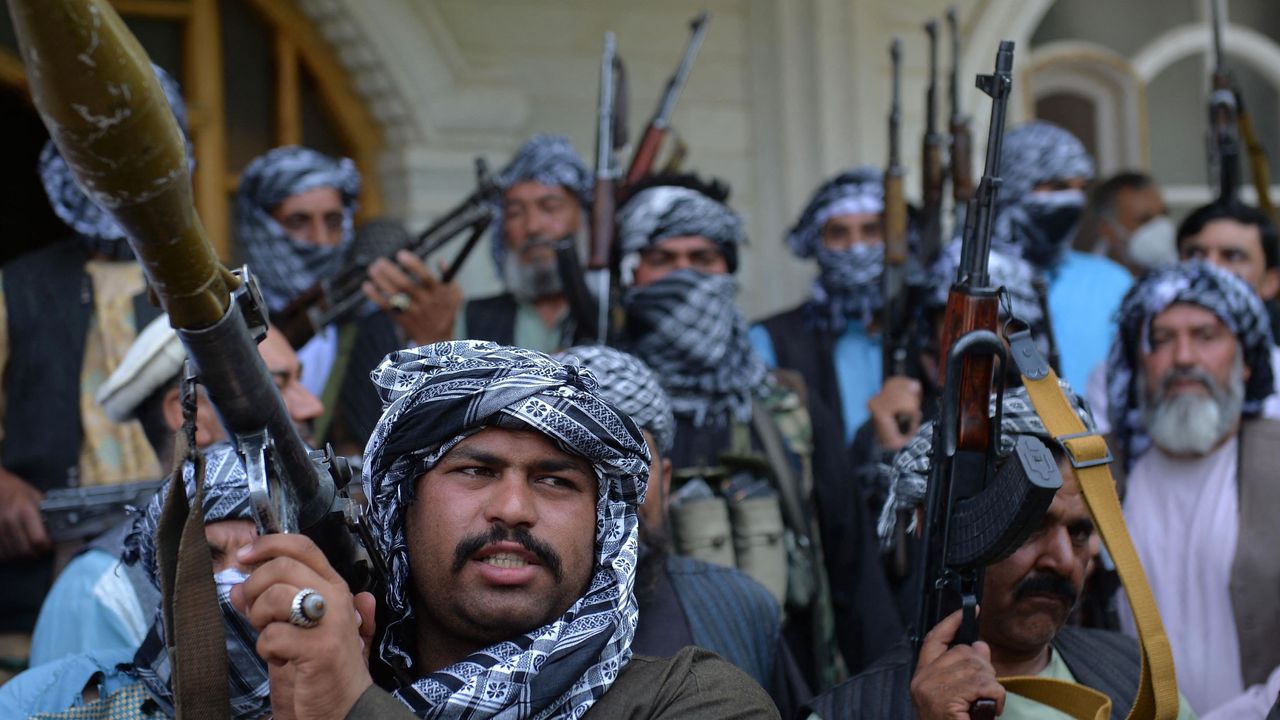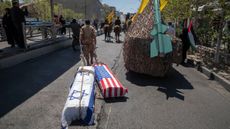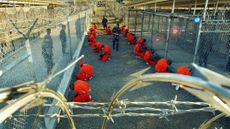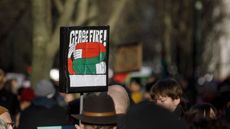Taliban seizes cities as Afghan military collapses
More than 1,000 soldiers flee across border as others hand over weapons to insurgents

The top US commander in Afghanistan formally stepped down yesterday in a simple ceremony in Kabul marking the end of the two-decade occupation.
General Austin “Scott” Miller officially transferred control just days after Joe Biden announced that US military operations in the war-ravaged country would cease by 31 August. Other Nato allies, including the UK, are also withdrawing nearly all military forces ahead of the president’s deadline.
But as Miller quietly gave up his duties, a very different scene was playing out in northern Afghanistan, a “traditional stronghold of US-allied warlords and an area dominated by the country’s ethnic minorities”, says Associated Press (AP) .
Subscribe to The Week
Escape your echo chamber. Get the facts behind the news, plus analysis from multiple perspectives.

Sign up for The Week's Free Newsletters
From our morning news briefing to a weekly Good News Newsletter, get the best of The Week delivered directly to your inbox.
From our morning news briefing to a weekly Good News Newsletter, get the best of The Week delivered directly to your inbox.
In the past 15 days alone, advances by the Islamist insurgents “have driven more than 5,600 families from their homes” as the nation’s security forces crumble, the news agency reports.
Taliban surge
Miller has handed control to two US generals, one of whom will oversee US military action from Central Command headquarters in Florida, while the other will command the small number of troops who remain in Afghanistan.
As the withdrawal gathers pace, civilians in the north are “fleeing their homes, fearful of living under the insurgents’ rule”, says AP. In Camp Istiqlal, a “makeshift camp on a rocky patch of land” near the city of Mazar-e-Sharif, “family after family” tell of “Taliban commanders using heavy-handed tactics as they overran their towns and villages”, the agency continues.
Sign up for Today's Best Articles in your inbox
A free daily email with the biggest news stories of the day – and the best features from TheWeek.com
Despite “persistent promises amid negotiations that they will not repeat their harsh rule of the past”, the insurgents have also “imposed their own fees and taxes” in Taliban-controlled areas.
“Anyone who can is leaving,” writes The Sunday Times’ chief foreign correspondent Christina Lamb, who describes markets in Kabul “full of carpets, kitchenware and gilded birdcages” as families sell “fall their worldly goods to raise money to flee”.
“Panic has set in” after the Taliban “swept through the western province of Herat and into the north, the one part of the country they never controlled”, Lamb says.
Many Afghan soldiers have “surrendered to the militants, handing over their equipment and weapons”, The Guardian reports, while others have fled to neighbouring nations.
Tajikistan’s President Emomali Rahmon last week mobilised 20,000 military reservists to guard his country’s border after 1,000 Afghanistan security personnel fled across the frontier rather than confront the oncoming Taliban forces.
‘Important to say farewell’
Following the final departure from Bagram Airfield - the key US base in Afghanistan - earlier this month, “there is perhaps just one thing that the entire political spectrum can agree on: no one foresaw the scale or speed of the collapse of the Afghan security forces in recent weeks”, says The Guardian.
“Instead of retrenchment there was collapse, and intelligence agencies have ripped up their assessments of the strength of the Afghan military,” the paper continues.
The US “now fears Kabul could fall within months”, with control of the capital city handed to the insurgents who were warned 20 years ago by then president George W. Bush that there was “nothing to negotiate” following the US-led invasion.
Meanwhile, “the Afghan government has been silent and seems to have no plan, as if it somehow thought the US would change its mind about leaving”, writes The Sunday Times’ Lamb.
The Taliban “recently claimed that their fighters have retaken 85% of territory in Afghanistan”, the BBC reports. Although that figure is “impossible to independently verify and disputed by the government”, analysts suggest the group controls at least “a third of Afghanistan's 400 districts”, says the broadcaster.
General Miller told guests at Monday's ceremony in Kabul that “it's important to me to say farewell”, adding: “Our job is now not to forget.”
The scale of the Afghan capitulation may make that second pledge easier than Miller might have hoped.
Emerging forces
Afghan National Security Adviser Hamdullah Mohib told reporters at yesterday's ceremony that “there will be no takeover”.
But despite his defiant tone, the Afghan government has “summoned one of the darker spectres from the country’s recent past”, in a desperate bid to “stem the losses”, says The Guardian. Afghanistan’s “warlords and regional strongmen” are being urged “to call up militias that fought the Taliban - but also each other - during the all-out civil war of the 1990s”, the paper reports.
The Financial Times (FT) says that as the Taliban begins “launching assaults on strategic cities and towns” including Kandahar and Qala-e-Naw, the warlords are spearheading a “second resistance” against the “Islamist onslaught”.
Some previously of the mercenaries fought alongside the US as part of the “Northern Alliance”, supported by local volunteers recruited to join militias under a “National Mobilisation” drive launched by Kabul to fight back against the insurgents.
All the same, “seeing the warlords of old re-arming to take them on is hardly reassuring” for many Afghans, writes The Sunday Times’ Lamb. “Many blame them for the the country descending into war and paving the way for the Taliban to take over” prior to the US occupation.
Talks are currently ongoing between the US, the Afghan government and the Taliban, after the Islamist group and the Donald Trump administration struck a deal centring on the troop withdrawal. But hopes that the Taliban will “lay down arms and participate instead in a redesigned political system” are fading rapidly, Lamb says.
“We see no urgency among the Taliban,” said senior negotiator Nader Nadery. “Meetings which are supposed to happen every other day now often don’t happen for days and then they refuse to talk about real issues. They just want to kill time and keep this process half-alive as a lever to gain international legitimacy but they are not serious.”
As footage emerges of Afghan troops “embracing their enemies” and being “sent home with money for travel”, says The Guardian, “capitulation in the face of a militant advance” is looking “far more attractive”.
“The scale of the losses in men, equipment and morale is so profound that one experienced officer, long hardened to death of individual comrades in arms, teared up talking about the disintegration of the armed forces,” the paper adds.
Many Afghans “fear a repeat of what happened after the Soviet withdrawal in 1989, when the country descended into civil war”, says Lamb, with “different factions backed by neighbouring countries such as Pakistan, Russia, Iran and China that have long interfered”.
Either way, with the Taliban swiftly regaining control, many more civilian lives are likely to be lost in a nation where the road to peace is so difficult to navigate.
Joe Evans is the world news editor at TheWeek.co.uk. He joined the team in 2019 and held roles including deputy news editor and acting news editor before moving into his current position in early 2021. He is a regular panellist on The Week Unwrapped podcast, discussing politics and foreign affairs.
Before joining The Week, he worked as a freelance journalist covering the UK and Ireland for German newspapers and magazines. A series of features on Brexit and the Irish border got him nominated for the Hostwriter Prize in 2019. Prior to settling down in London, he lived and worked in Cambodia, where he ran communications for a non-governmental organisation and worked as a journalist covering Southeast Asia. He has a master’s degree in journalism from City, University of London, and before that studied English Literature at the University of Manchester.
-
 Why does Elon Musk take his son everywhere?
Why does Elon Musk take his son everywhere?Talking Point With his four-year-old 'emotional support human' by his side, what message is the world's richest man sending?
By Rebekah Evans, The Week UK Published
-
 The Week Unwrapped: Why are sinkholes becoming more common?
The Week Unwrapped: Why are sinkholes becoming more common?Podcast Plus, will Saudi investment help create the "Netflix of sport"? And why has New Zealand's new tourism campaign met with a savage reception?
By The Week UK Published
-
 How Poland became Europe's military power
How Poland became Europe's military powerThe Explainer Warsaw has made its armed forces a priority as it looks to protect its borders and stay close to the US
By Elizabeth Carr-Ellis, The Week UK Published
-
 Will Iran's attack on Israel backfire?
Will Iran's attack on Israel backfire?Today's Big Question The unprecedented targeting of Israel could be a 'godsend' for Netanyahu as the limits of Tehran's military power are exposed
By Elliott Goat, The Week UK Published
-
 Will Iran risk all-out war with Israel?
Will Iran risk all-out war with Israel?Today's Big Question Tehran has not wanted to be directly involved in the Middle East conflict so far. But that could be about to change
By Chas Newkey-Burden, The Week UK Published
-
 A history of Guantánamo Bay
A history of Guantánamo BayThe Explainer War of Terror's 'symbol of torture, rendition and indefinite detention' is subject of new Serial podcast series
By The Week UK Published
-
 'Humanitarian islands': how will Israel's plan for Rafah civilians work?
'Humanitarian islands': how will Israel's plan for Rafah civilians work?Today's Big Question Designated zones in central Gaza to provide temporary housing, food and water for more than a million displaced Palestinians
By The Week UK Published
-
 How likely is an accidental nuclear incident?
How likely is an accidental nuclear incident?The Explainer Artificial intelligence, secret enemy tests or false alarms could trigger inadvertent launch or detonation
By Chas Newkey-Burden, The Week UK Published
-
 Pentagon struggles to explain Defense Secretary Lloyd Austin's secret hospitalization
Pentagon struggles to explain Defense Secretary Lloyd Austin's secret hospitalizationSpeed Read The intensely private Pentagon chief kept even President Joe Biden in the dark about his illness for 3 days
By Peter Weber, The Week US Published
-
 Israel-Hamas: what do both sides need in order to agree a sustainable ceasefire?
Israel-Hamas: what do both sides need in order to agree a sustainable ceasefire?Today's Big Question Israel and Hamas 'open' to renewed ceasefire and hostage release, as pressure mounts on Benjamin Netanyahu at home and abroad
By Elliott Goat, The Week UK Published
-
 Cluster bomb controversy hangs over Biden’s ‘chilly’ visit to UK
Cluster bomb controversy hangs over Biden’s ‘chilly’ visit to UKTalking Point US cites military ‘expediency’ but allies warn bombs could lose Ukraine the ‘moral high ground’
By The Week Staff Published